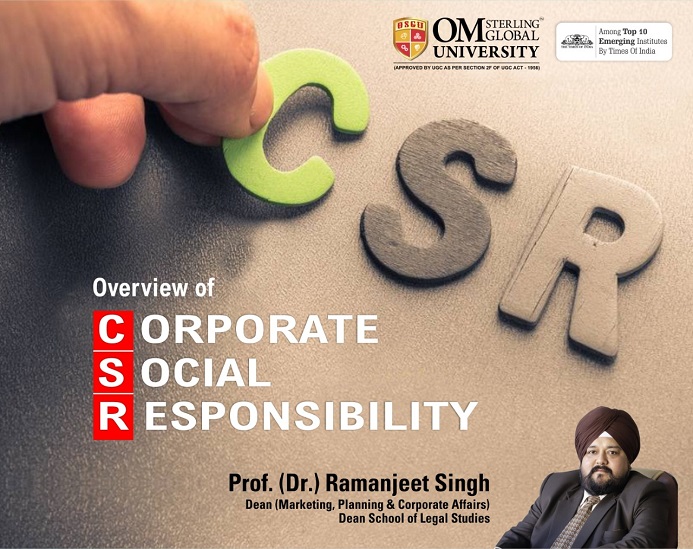-
Announcement : Admission Open Apply Now
 Pratibha Samman Samaroh– 2024
Pratibha Samman Samaroh– 2024 
Corporate Social Responsibility

Business ethics is the application of ethical values to business behavior
November 29, 2021
Kisan Diwas Celebrated at Om Sterling Global University.
December 28, 2021
Corporate Social Responsibility
Introduction:
India is the first and only country in the world which had mandated corporate Social Responsibility (CSR) for certain corporate entities. Inclusion of CSR in the statue is a unique provision in the world. In simple terms (CSR) is a company’s sense of responsibility towards the community and environment in which it operates. The concepts of CSR have been imbibed by the Indian society from the very beginning and CSR aligns business operations with societal values. Many of the leading corporates across the world had realized the importance of being associated with socially relevant causes as a means of enhancing their corporate image and reputation. Tata and Birla are the two industrial houses in India who have taken up charity and philanthropic activities decades before the con concept of CSR has arrived. However, charity and philanthropy are not CSR, as they may be one-time activities and long-term commitment may or may not be there. CSR is a long-term commitment towards development of the society and its welfare.
The spirit of CSR in the words of late JRD Tata is, “To enrich quality of life in the society we operate in, we need to give back to the society manifolds than what we get from it” and “No success in materials terms is worthwhile unless it serves the needs or interests of the country and its people.
The importance of inclusive Growth is now widely recognized as an essential part of India’s guest for development and reiterates its commitment to include those sections of the society that were hitherto remain excluded from mainstream of development. In line with this national endeavor, CSR was conceived as an instrument for integrating social, environmental and human development concerns in the entire mainstreaming the concept of business responsibilities, Ministry of corporate Affairs (MCA) had issued “Voluntary Guidelines on Corporate Social Responsibility 2009, which were further refined subsequently as “National Voluntary Guidelines on Social, Environmental and Economic Responsibilities of Business, 2011(NVG). Essentially this is a set of nine principles that offer Indian Businesses an understanding and approach to inculcate responsible business conduct. These nine principles are
- Conduct and Govern with ethics, transparency, and accountability-The principle recognizes that ethical conduct in all its functions and processes as the cornerstone of responsible business.
- Provide gods and services that are safe and contribute to sustainability throughout their life cycle-this principle emphasizes that in order to function effectively and profitably business should work to improve the quality of life of people.
- Promote the well-being of all employees.
- Respect the interest of and be responsive towards all stakeholder, especially those who are disadvantaged, vulnerable and marginalized.
- Respect and promote human rights.
- Respect, Protect and make efforts to restore the environment.
- While engaged to influence public and regularity policy it should be done in a responsible manner.
- Support inclusive growth and equitable development.
- Engage with and provide value to their customers and consumers in a responsible manner.
The above guidelines are not prescriptive in nature but seek to advise Indian businesses to take into account Indian social and businesses realities and global trends while promoting their businesses. Through these Guidelines, the Ministry urged the business sector to adopt the principles contained in the Guidelines for responsible business practices. The adoption of these National Voluntary Guidelines will improve the ability of businesses to enhance their competitive strengths, improve their reputations, increase their ability to attract and retain talent and manage their relations with investors and society at large.
CORPORATE SOCIAL RESPONSIBILITY (CSR)
Business involvement in social welfare and development has been a tradition in India. Its evolution from individuals’ charity or philanthropy to Corporate Social Responsible Business can be seen in the business sector over the years. CSR is not doing charity or mere giving donations. CSR is a way of conducting business, by which corporate entities visibly contribute to the social good. Socially responsible companies do not limit themselves to using resources to engage in activities that increase only their profits. They use CSR to integrate economic, environmental and social objectives with the company’s operations and growth. The eighth principle of Non-Voluntary Guidelines or ‘inclusive and equitable growth’ focuses on encouraging business action on national development priorities including community development initiatives and strategic CSR based on the shared value concept. This principle of NVG was subsequently translated into a mandatory provision of Corporate Social Responsibility in section 135 of the Companies Act, 2013. While section 135 contains the provisions of CSR, Schedule VII of the overview of Corporate Social Responsibility in the light of Recent Amendments.
Act enumerates the activities that can be undertaken under CSR. The permissible CSR activities enlisted in Schedule VII are consistent with national priorities of sustainable and inclusive development. The companies Rules, 2014 prescribe the manner in which the companies can undertake their CSR programs, projects and activities. NVGs are much wider in scope than the provision of CSR and remain the guiding principles for corporate to conduct their businesses in a socially responsible, environmentally sustainable manner. Whereas CSR rules prescribes corporates to undertake CSR activities beyond their normal course of business.
Under the Companies (Corporate Social Responsibility Policy)Amendment Rules, 2021 (the ‘Rules), the term Corporate Responsibility was comprehensively defined as under
“Corporate Social Responsibility (CSR)” means the activities Undertaken by a Company in pursuance of its statutory Obligation laid down in section 135 of the Act in accordance With the provisions contained in these rules, but shall not include the following, namely:
- Activities undertaken in pursuance of normal course of business of the company:
Provided that any company engaged in research and Development activity of new vaccine, drugs and medical devices in their normal course of business may undertake Research and development activity of new vaccine, drugs and medical devices related to CovID-19 for financial Years 2020-21, 2021-22, 2022-23 subject to the conditions that
- Such research and development activities shall be carried out in collaboration with any of the institutes or organizations mentioned in item (ix) of Schedule VIl to the Act
- Details of such activity shall be disclosed separately in the Annual report on CSR included in the Board’s Report
- Any activity undertaken by the company outside India except for training of Indian sports personnel representing any State or Union territory at national level or India at international level
- Contribution of any amount directly or indirectly to any political party under section 182 of the Act
- Activities benefitting employees of the company as defined in clause (k) of section 2 of the Code on Wages, 2019 (29of 2019)
- Activities supported by the companies on sponsorship basis for deriving marketing benefits for its products or services
- Activities carried out for fulfillment of any other statutory obligations under any law in force in India
CSR POLICY
As defined under the Rules, CSR Policy refers to a statement Containing the approach and direction given by the board of a company, taking into account the recommendations of its CSR Committee, and includes guiding principles for selection, implementation and monitoring of activities as well as formulation of the annual action plan.
DISPLAY OF CSR ACTIVITIES ON THE WEBSITE OF THE COMPANY
The Board of Directors of the Company shall mandatorily disclose the composition of the CSR Committee, and CSR Policy and Projects approved by the Board on their website if any, for public access.
CSR EXPENDITURE
Expenditure can be classified as CSR expenditure if
- It is within the areas covered by Schedule VII and
- Is as per CSR policy approved by the company’s Board of Directors
Companies are required to apply facts and circumstances in each case for categorization of such spends. CSR expenditure shall exclude expenditure incurred on activities undertaken in pursuance of its ‘normal course of business’. Similarly, Programmes or projects or activities that are carried Out as a pre-condition for setting up a business or as part of a contractual obligation undertaken by the company or in accordance with any other law, should not be considered as CSR Expenditure.
Similarly, expenditure incurred on CSR projects or programmes or activities that benefit only the employees of the company and their families shall not be considered as CSR. However, expenditure incurred on programmes or activities that are for the benefit of the entire society without any restriction and incidentally also includes some employees or their families will still be considered as CSR expenditure as long as such benefits are not exclusively for the benefit of Overview of Corporate Social Responsibility in the light of Recent Amendments Such employees. Employees of the company for this purpose means as defined in clause (k) of section 2 of the Code on Wages, 2019.
Under Rule 7 of the Companies (Corporate Social Responsibility) Rules, 2014 CSR expenditure shall include all expenditure including contribution to corpus for projects or programmes relating to CSR activities approved by the Board on the recommendation of its CSR Committee. Rule 7 was substituted under the revised CSR Rules; where in the concept of corpus is not there. In view of this any contribution to corpus for projects does not amount to CSR expenditure.
- Administrative Overheads
- Surplus arising out of CSR activities
- Amount spent in excess of mandatory requirement
- Creation or acquisition of capital asset
PENAL PROVISIONS
From a comply or explain approach CSR provisions are transformed into attracting stringent penalties for its non-compliance. lf a company is in default in complying with the provisions of section 135(5) or (6), the company shall be liable a penalty of twice the amount required to be transferred by the company to the Fund specified in Schedule VII or the Unspent Corporate Social Responsibility Account as the case may be or one crore rupees, whichever is less. Every officer of the company who is in default shall be liable to a penalty of one-tenth of the amount required to be transferred by the company to such Fund specified in Schedule VIl or the Unspent Corporate Social Responsibility Account as the case may be or two lakh rupees, whichever is less. Under the Companies (Amendment) Act, 2019 every officer of the company who is in default was liable to be punished with imprisonment for a term which may extend to three years or with fine. This has been relaxed under the Companies Amendment) Act, 2020.
CONCLUSION
The concept of Corporate Social Responsibility is gaining prominence over a period of time and CSR has emerged as an effective tool that synergizes the efforts of corporate sector and the social sector towards sustainable growth and development of societal objectives at large. In the words of Ratan Tata “A company should have in its DNA, a Sense to work for the welfare of the community. CSR is an Extension of individual sense of social responsibility. Active participation in CSR projects is important for a company. The major challenge to CSR is that still it is being felt as a charity or a mere statutory responsibility rather than discharging the responsibility voluntarily for the social cause Anders Dahlvig former President of lkea (the Swedish furniture store chain) quoted in Financial Times. “It is not good enough to do what the law says. We need to be in the forefront of these social responsibility issues. “Efficient CSR requires effective partnerships among Corporates NGOS and the Government to interwoven business with social inclusion, environment sustainability and corporate responsibility.



